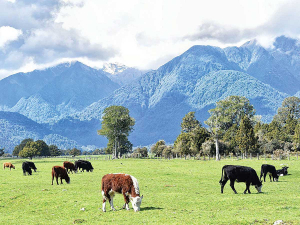Battle for milk
OPINION: Fonterra may be on the verge of selling its consumer business in New Zealand, but the co-operative is not keen on giving any ground to its competitors in the country.
 Fonterra says that pasture-based farming is what has kept the New Zealand dairy industry's footprint low.
Fonterra says that pasture-based farming is what has kept the New Zealand dairy industry's footprint low.
Fonterra says new analysis showing New Zealand dairy farms having the lowest carbon footprint in the world is a result of the country’s unique pasture-based farming.
Fonterra director of on-farm excellence, Charlotte Rutherford, says it also reflects the hard graft of the co-operative’s farmer shareholders.
“Which as an employee of the co-op makes me feel pretty proud,” says Rutherford.
“We’ve seen consumers become increasingly interested in the carbon footprint of their products, and today’s report confirms we’re well placed to meet people’s desire for food that’s kinder to the planet.
“We know more needs to be done to keep improving and we’re up for the challenge.”
Innovation is a key part of the co-op’s strategy and it has multiple partnerships to develop the tools and solutions needed to support farmers, particularly in areas where they face tough challenges, such as reducing methane emissions.
“One of the keys to helping guide farmers to continuously improve is ensuring they understand their emissions profiles,” she says.
“Last year, all our farmers received a greenhouse gas emission report specific to their farms. It’s a very practical step toward helping New Zealand meet climate change commitments.”
But finding a solution requires more than just hard graft from the co-op’s farmers and solutions like Kowbucha, seaweed and feed additives are being investigated for potential breakthroughs in reducing emissions from cows. Fonterra has also teamed up with Nestlé and DairyNZ to expand a promising plantain trial to help improve waterways and reduce on-farm greenhouse gas (GHG) emissions.
The report from AgResearch, commissioned by DairyNZ compares New Zealand with 17 other countries. It confirms our footprint is 70% lower than the global average and 46% lower than the average of other countries in the study, which includes all major milk producers.
The World Wide Sires National All Day Breeds Best Youth Camp Best All Rounder plaudit has become family affair, with 2026 Paramount Cup winner Holly Williams following in her sister Zara's footsteps.
DairyNZ is giving New Zealand farmers a unique opportunity to gain hands-on governance and leadership experience within the dairy sector.
Herd improvement company LIC has posted a 5.2% lift in half-year revenue, thanks to increasing demand for genetics.
According to the latest Fresh Produce Trend Report from United Fresh, 2026 will be a year where fruit and vegetables are shaped by cost pressures, rapid digital adoption, and a renewed focus on wellbeing at home.
The Roar is a highlight of the game hunting calendar in New Zealand, with thousands of hunters set to head for the hills to hunt male stags during March and April.
OPINION: The past few weeks have been tough on farms across the North Island: floods and storms have caused damage and disruption to families and businesses.